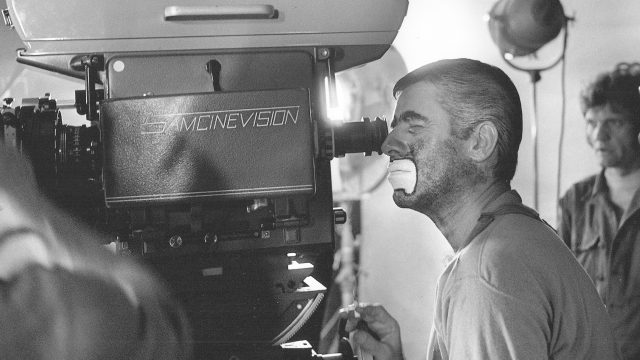Crammed Into the Tiny Car This Week:
- an unfinished film
- hip distribution
- action movies
- prison flicks
- punk!
An extra squirt of seltzer to Miller for contributing this week. Send articles throughout the next week to ploughmanplods [at] gmail, post articles from the past week below for discussion, and Have a Happy Friday!
At The New Republic, Benjamin Charles Germain Lee watches the finally-released footage of The Day The Clown Cried and finds it to be thornier than and superior to most Holocaust movies:
Unlike most Holocaust films, the footage that I saw did not shy away from the question of how moral it is to find humor in atrocity, and paid the price in people’s imaginations. …I felt guilty for laughing; I questioned my guilt. Just as the film itself remains unfinished, my feelings remain unresolved. The intimate, complex relationship between tragedy and humor was fundamental to Lewis’s approach to performing. “I only need to call upon my sorrow to create laughter,” he told Parade magazine in 1984. The footage I saw, far from offering some outrageous insult to my sensibilities, invites us to explore this precarious balance, and the conventional limits and purposes of humor as well—not just when it comes to atrocity, but also in the viewer’s life.
The Hollywood Reporter‘s Pamela McClintock talks to Neon founder Tom Quinn about the distribution company’s successes, unique marketing campaign for Longlegs and rivalry with other indie darling A24:
We are both New York-centric companies. That’s where we started. Most of us, if not all of us, have worked in New York. I spent 20 years there but now live in L.A. We’ve exchanged a lot of directors. We pick up movies that they walked away from, and vice versa, but we’re not the same. Here’s a stark difference: In their first seven years, they released three foreign-language films and three documentaries. We’ve released 64 — 32 foreign-language films and 32 documentaries. We are very different, but are very much on the same trajectory. They won best picture, and we won best picture. But I don’t understand their business and their valuations. I’m sure most of the industry doesn’t either, but more power to them.
Polygon‘s Tasha Robinson interviews writer-director Jeremy Saulnier about the touchy subjects in his new old-school action flick:
The primary goal here was to make a traditional American action flick, with ideally more artistry, a little headier. I like to get into the very grounded nature, the minutiae other films might pass by, as far as institutions go. Not just as it relates to race, but as it relates to human beings in these systems — what part they play, whether they’re aware of it or not, or if they are, how they choose to disavow their responsibility, or ignore the fact that they’re perpetuating corrupt systems. So those mechanics were easier to research and dissect.
For Film Comment, incarcerated writer Sara Kielly reviews the selections of her prison’s movie club and the process of reserving screening time:
At 6.m., when our cell doors open and the football fans are still sleeping off their buffoonery, I squeeze through the partially open door sideways to run for a spot in the kitchen, while Iz hustles to secure a two-hour slot for the TV in the rec room. You never know how many residents will join the race, but the quicker you’re out the door, the better. I have gotten good at all-out sprinting in flip-flops, and it is rare that anyone ever beats me to the kitchen. All those drag-queen years of running in six-inch stilettos have finally paid off, even if my waistline has increased slightly thanks to Iz’s cooking. […] The Movie Wives tend to prefer comedies, rom-coms, and thrillers—though unlike Iz, I also enjoy a good tearjerker or a feel-good family movie, such as The Odd Life of Timothy Green (2012) with Jennifer Garner and Joel Edgerton. The two films that we look forward to seeing the most in the future are Joker: Folie à Deux, starring Joaquin Phoenix and Lady Gaga (Iz’s choice), and the film version of the musical Wicked, starring Ariana Grande and Cynthia Erivo (my pick).
At The A.V. Club, Craig D. Lindsey talks about the punk soundtrack that saved Repo Man from obscurity:
The soundtrack is what saved Repo Man from becoming a forgotten flop. Universal pulled the movie from theaters after one week, but the soundtrack—released on MCA Records’ “edgy” new subsidiary San Andreas Records—sold fifty thousand copies, six months after the movie’s less-than-stellar opening. This prompted Universal to re-release the film in theaters, where it began its rep as a cult fave that would get even more devoted fans once it eventually hit video and cable. For many an alienated youth, the Repo Man soundtrack (which sadly isn’t available on Spotify or Apple Music, although there is a tribute album available to stream) was their introduction to the renegade, hardcore punk scene that was happening on the West Coast. As A.V. Club contributor Noel Murray wrote in 2013, “The punks in my high school used to say that nobody ever bought the Repo Man soundtrack. Everyone’s copy had either been borrowed or duped from a friend, or stolen outright. (Me, I did all three at once: I stole a duped cassette from a buddy, who’d borrowed it from someone else.)”

